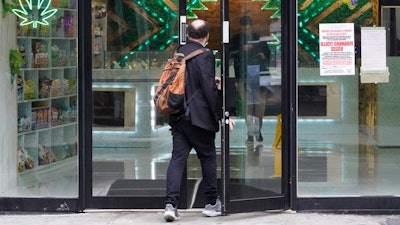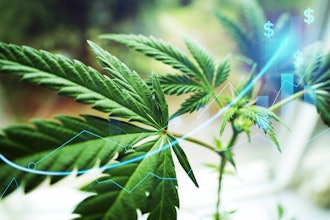
NEW YORK (AP) — Fed up with hundreds of bootleg pot shops, New York launched new inspections this month aimed at getting rid of the unlicensed stores that are troubling the state's fledgling legal marijuana market. "You will be caught," the governor vowed.
But anyone who expects to see the stores shape up or shut down might need patience.
Two weeks after the enforcement push debuted with authorities issuing violation notices and confiscating contraband weed at 11 Manhattan storefronts, only two appeared to have closed when an Associated Press reporter visited, and two others were no longer selling marijuana products.
At the rest, it was business as usual.
In some shops, customers came and went right past the "ILLICIT CANNABIS SEIZED" notices inspectors had posted in the windows. Other retailers apparently took down the signs, ignoring their stated warnings of additional penalties for doing so. A couple of stores advertised marijuana products on sidewalk signs. And another was thick with pot smoke from customers enjoying their purchases in its "lounge."
For all its new initiative, the state won't immediately shutter the illegal shops, which have been operating with relative impunity throughout New York City.
Inspections are just a first step toward hefty fines and, potentially, closure and even criminal prosecution. Still, regulators hope this will be a turning point in weeding out illegal sellers and giving authorized ones more room to flourish.
"To the citizens that want us to go out and padlock on day one: We do have to afford a due process system," explains state Office of Cannabis Management enforcement director Daniel Haughney. "As you see the process actually play out, step by step, it will get to a point where you're not going to see these illicit shops out there any longer."
A manager at one of the first 11 shops that were cited declined to discuss it. Managers and owners of those that hadn't shut down didn't respond to requests for comment.
Since New York legalized recreational marijuana use in March 2021, it has struggled to enforce the new regulations on sales.
The state limited the amount of pot someone can have for personal use and allowed for criminal charges, including felonies, for illegally possessing and selling larger amounts. But officials have stressed that they don't want to "recriminalize" the drug after striving to make up for decades of prosecutions.
New York set aside its first dispensary licenses for people who had pot convictions or relatives who did, planned to find and outfit storefronts for them to lease, and more. But those complexities helped slow the rollout. Just 15 approved retailers have opened in a state of nearly 20 million people, compared to the 25 dispensaries that opened in the first three months of legal sales in neighboring Vermont, which has only about 650,000 residents.
Unlicensed sellers rushed to fill the vacuum in New York. That has happened in some other states, but scale and density have made the problem especially visible in New York City, where shops have appeared every couple of blocks in some neighborhoods.
Their proliferation is irking lawmakers and licensees alike.
"The most frustrating part is that there's just not a clear understanding within the public about the difference between a licensed dispensary and an unlicensed dispensary," since the latter are operating so openly, said Arana Hankin-Biggers, president of a licensed Manhattan dispensary called Union Square Travel Agency.
She emphasizes that buying legal means that products have been tested at state-approved labs and follow labeling and other rules. She notes that half her dispensary's proceeds go to a nonprofit partner that helps formerly incarcerated people. Yet those selling points vie with the sheer abundance of unauthorized options nearby.
Price comparisons between the licensed and unlicensed sellers are difficult because of the range of products and stores; also, licensed sellers collect state taxes that illicit shops likely do not. Hankin-Biggers said Union Square Travel Agency's prices are competitive, and sometimes lower.
The state cannabis office started trying to oust unauthorized marijuana stores last year by sending warning letters. But at the time, it didn't have the clear authority that it now has for inspections, fines and other consequences.
Meanwhile, some local officials took action. New York City has towed trucks suspected of selling weed, sued shops, and, with the state's help, inspected over 600 smoke shops since November on suspicion of illegal sales of pot or other items. Those inspections have led to more than 1,000 violation notices, 100 arrests, $15 million in fines and millions of dollars' worth of seizures, Mayor Eric Adams' office said.
"New York City is doing everything in its power" to tackle the problem, mayoral spokesperson Kayla Mamelak said in a statement that commended the state's new efforts. Meanwhile, the city could levy new fines against illegal weed shops' landlords under a measure the City Council passed last week, and that Adams appears likely to support.
The state's new powers come from legislation that Gov. Kathy Hochul, a Democrat, signed into the state budget in May. It allows for inspections, seizures, fines that can reach $20,000 a day plus possible tax penalties, and, in some cases, closing shops and going after landlords.
After an inspection and seizure, retailers are entitled to an administrative hearing to determine whether they'll be fined. In order to lock the doors, the state would have to go to court and demonstrate that "the public health, safety, or welfare immediately requires" such a step.
Arrests, while possible, are "not the focus point," as the state hopes that fines and seizures will persuade illegal sellers to stop, Haughney said.
Hankin-Biggers said she's already seen an impact. The first inspections included several unauthorized shops near her licensed dispensary, and some then pivoted to other products or apparently closed.
"I'm super-hopeful," she said. "It's going to take some time, but I think we're starting to finally make progress."






















